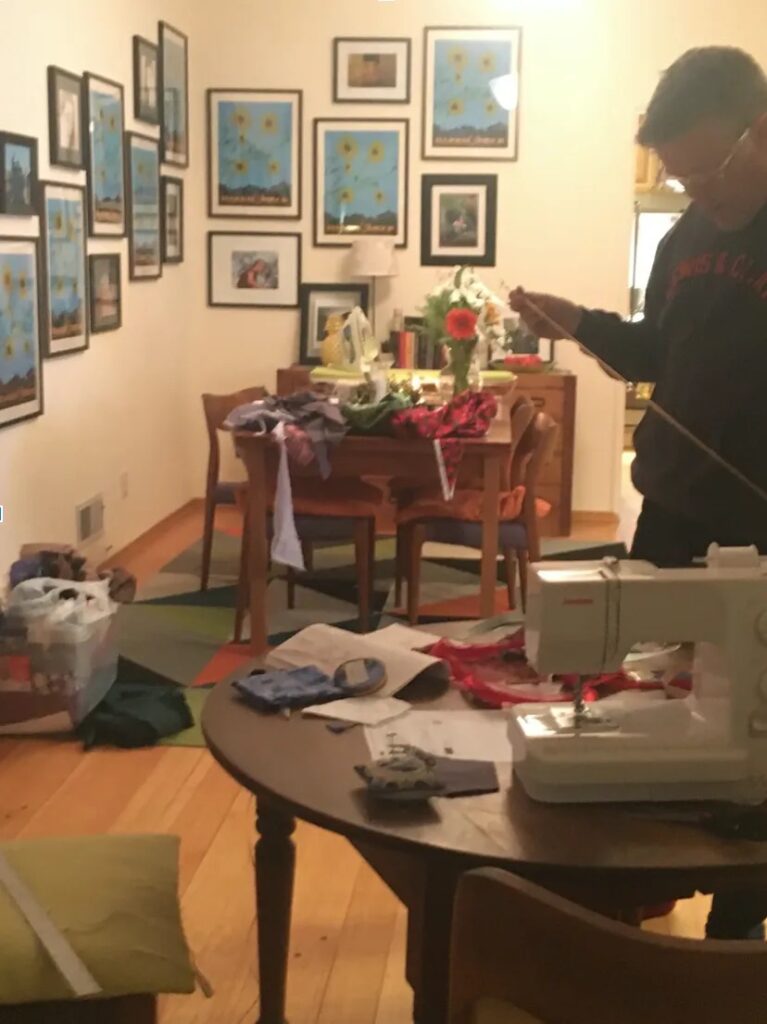Summary:
An invitation to revise a poem and share the process. Originally posted during the COVID-19 lockdown of 2020. Originally published on April 20, 2020
I love a clean house, but as the mom (or moomtan, as I am known to all of my daughters) of a blended family which includes 3 20 year-old women, I often don’t live in one. Last week, I got up early on Saturday morning and cleaned our house from one end to the other. I dusted and vacuumed and put things away. I washed dishes, and mopped the kitchen floor, and then I sat in the still quiet space and drank a cup of coffee and read a book. When I was finished, I rinsed my coffee cup and placed it in the dishwasher. I admired my handiwork before going off to take a shower and get ready for my day.
The picture above depicts our family room right before I went to bed that night. Part of me was frustrated, but the greater part felt deeply satisfied. For the 14 hours that we had spent awake together in this space, everyone had been busy making something. Our seamstress daughter, the one who often makes whole period costumes from the undergarments out, had turned her sewing machine to creating masks for everyone in our extended family, while teaching the rest of us to make our own. The vegetarian had made us all dinner. She’s perfecting her fried rice, which means we eat it at least once a week, and discuss variations in ingredients and techniques, cooking times and heat, soy sauce versus tamari, etc.
In fact, we had all spent the whole day sheltering in place together, in the very engaging, super messy, time consuming act of “crafting.” According to Matthew B. Crawford, author of Shopcraft as Soulcraft, “Craftsmanship means dwelling on a task for a long time and going deeply into it, because you want to get it right.” From protective masks to vegetarian fried rice, to blog post writing, we were each deeply engaged, spending a lot of time (and making a lot of mess) in order to get the thing we were making right.
For poets, it seems, the time spent dwelling on the task of making poems might focus on finding just the right words, it might have to do with thinking about their placement on the page, or it might have to do with playing with forms that can extend the purpose. In the poem below, “Thoughts While Packing a Trunk” by Christopher Morley, the poet uses an extended metaphor to describe the craft of making a sonnet.
Thoughts While Packing a Trunk
by Christopher Morley
The sonnet is a trunk, and you must pack
With care, to ship frail baggage far away;
The octet is the trunk; sestet, the tray;
Tight, but not overloaded, is the knack.
First, at the bottom, heavy thoughts you stack,
And in the chinks your adjectives you lay —
Your phrases, folded neatly as you may,
Stowing a syllable in every crack.
Then, in the tray, your daintier stuff is hid:
The tender quatrain where your moral sings —
Be careful, though, lest as you close the lid
You crush and crumple all these fragile things.
Your couplet snaps the hasps and turns the key —
Ship to The Editor, marked C. O. D.
This week’s poetry challenge is to dwell on the task of writing poetry, to dive deeply into it to see if you can’t make something you’ve written just a little more right. We’d love to see your new poems, and we’d also love to hear about your process. How did you pack your trunk with care? Chink in your adjectives? Fold your phrases? Stow your syllables?
Feel free to share a poem, two drafts, and/or a description of your process this week.
And stay tuned this week to hear from some great poets and teachers who will lead you through exercises or ideas for crafting your way to even more amazing poems.

